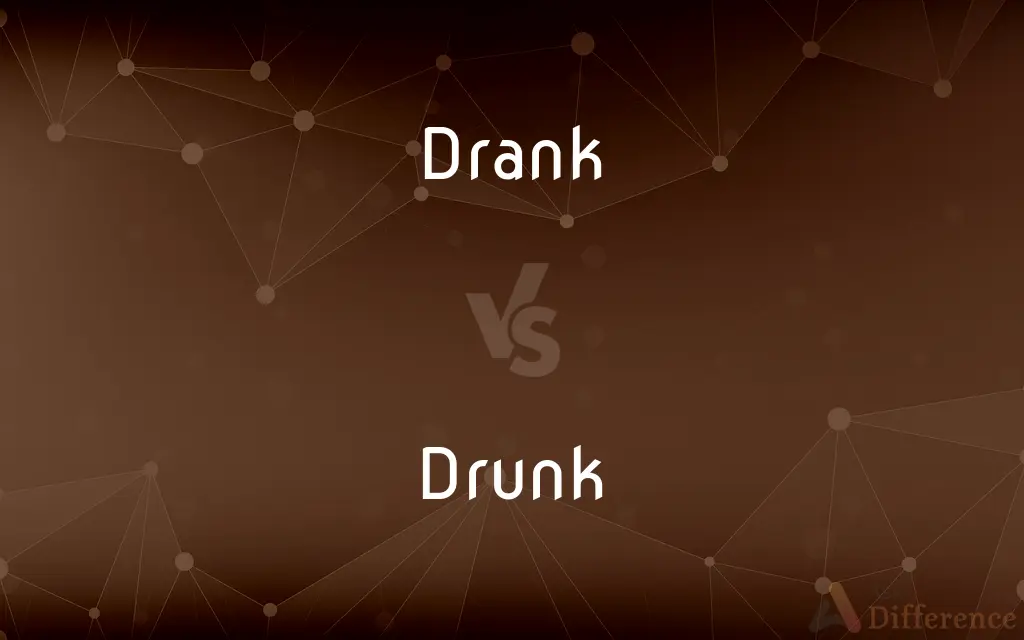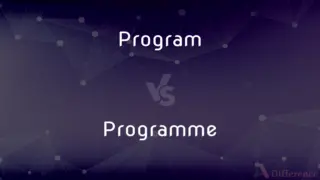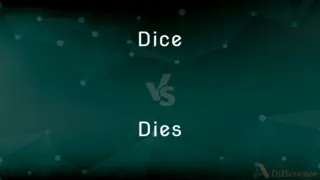Drank vs. Drunk — What's the Difference?
Edited by Tayyaba Rehman — By Fiza Rafique — Updated on October 11, 2023
Drank is the past tense of "drink." Drunk is the past participle used with auxiliary verbs.

Difference Between Drank and Drunk
Table of Contents
ADVERTISEMENT
Key Differences
"Drank" and "drunk" are both forms of the verb "drink," which means to consume a liquid. However, they are used in different tenses and contexts. "Drank" is the simple past tense, signifying a completed action, while "drunk" is the past participle, often used with auxiliary verbs to form perfect tenses.
When we talk about a completed action in the past, we use "drank." For instance, "She drank water" indicates that she consumed water at some point in the past. On the other hand, "drunk" requires an auxiliary verb. In the sentence, "She has drunk water," "has" is the auxiliary verb, and "drunk" is the main verb in its past participle form.
It's crucial to use these words in their correct contexts to maintain grammatical accuracy. Misusing "drank" and "drunk" can lead to confusion. A correct example would be, "Yesterday, he drank the entire bottle," as it's a simple past action. In contrast, "He had drunk the entire bottle before I arrived" correctly employs "drunk" in the past perfect tense.
"Drank" and "drunk" can both be used to refer to the action of consuming alcohol. "He drank wine last night" denotes a past action of alcohol consumption. Meanwhile, "drunk" can also be used as an adjective, as in "He was drunk last night," indicating the state of intoxication.
Although both words are related to the act of drinking, their applications differ based on tense and structure. Understanding their distinct roles in sentences ensures clear and effective communication. Using "drank" when referring to a simple past action and "drunk" in conjunction with auxiliary verbs helps maintain grammatical correctness.
ADVERTISEMENT
Comparison Chart
Form of the Verb
Simple Past
Past Participle
Usage
Refers to a past action
Used with auxiliary verbs or as an adjective
Requires Auxiliary Verb?
No
Yes (when used as a verb form)
Example Sentence
"She drank the juice."
"She has drunk the juice."
Associated with Alcohol?
Can be used to signify past alcohol consumption
Can denote both past alcohol consumption and state of intoxication
Compare with Definitions
Drank
Simple past tense of "drink."
She drank her coffee quickly.
Drunk
Can signify the condition after consuming excessive alcohol.
Being drunk impairs judgment.
Drank
Denotes the action of consuming a liquid in the past.
He drank water after his run.
Drunk
Past participle form of "drink."
He has drunk all his soda.
Drank
Can signify past alcohol consumption.
They drank wine at the party.
Drunk
Used with auxiliary verbs to denote actions related to drinking.
She had drunk tea before she left.
Drank
Refers to a completed action of drinking.
I drank tea yesterday.
Drunk
Can indicate a state of intoxication as an adjective.
He was drunk at the party.
Drank
Refers to an action without the need for an auxiliary verb.
The cat drank the milk.
Drunk
Refers to a past action of drinking when used with auxiliary verbs.
They've drunk their coffees.
Drank
Past of drink
Drunk
Past participle of drink.
Drank
A drink, especially of alcohol
The dranks were definitely flowin'
Drunk
Intoxicated with alcoholic liquor to the point of impairment of physical and mental faculties.
Drank
Past tense of drink.
Drunk
Caused or influenced by intoxication.
Drank
(slang) Dextromethorphan.
Drunk
Overcome by strong feeling or emotion
Drunk with power.
Drank
(slang) A drink, usually alcoholic.
Drunk
A drunkard.
Drank
Inflection of drink
He'd drank alcohol prior to driving off the road.
Drunk
A bout of drinking.
Drank
Of Drink.
Drunk
As a result of excessive alcohol consumption, usually by drinking alcoholic beverages.
Drank
Wild oats, or darnel grass. See Drake a plant.
Drunk
Or frequently in a state of intoxication.
Drunk
(usually followed by with or on) elated or emboldened.
Drunk with power, he immediately ordered a management reshuffle.
Drunk
Or saturated with moisture or liquid.
Drunk
One who is intoxicated with alcohol.
Drunk
A habitual drinker, especially one who is frequently intoxicated.
Drunk
A drinking-bout; a period of drunkenness.
Drunk
A drunken state.
Drunk
Inflection of drink
Drunk
(Southern US) drink
Drunk
Intoxicated with, or as with, strong drink; inebriated; drunken; - never used attributively, but always predicatively; as, the man is drunk (not, a drunk man).
Be not drunk with wine, where in is excess.
Drunk with recent prosperity.
Drunk
Drenched or saturated with moisture or liquid.
I will make mine arrows drunk with blood.
Drunk
A drunken condition; a spree.
Drunk
A chronic drinker
Drunk
Someone who is intoxicated
Drunk
Stupefied or excited by a chemical substance (especially alcohol);
A noisy crowd of intoxicated sailors
Helplessly inebriated
Drunk
As if under the influence of alcohol;
Felt intoxicated by her success
Drunk with excitement
Common Curiosities
In which tense is "drunk" typically used?
"Drunk" is the past participle and is used in perfect tenses with auxiliary verbs.
Is "drank" used for past actions?
Yes, "drank" is the simple past tense of "drink."
Can "drunk" be used as an adjective?
Yes, "drunk" can describe someone who is intoxicated.
Is it proper to say, "I have drank all the milk"?
No, the correct form is "I have drunk all the milk."
Can both "drank" and "drunk" refer to alcohol consumption?
Yes, both can be related to the action of consuming alcohol.
Is it correct to say, "I drunk a lot of water"?
No, the correct form is "I drank a lot of water."
Can "drank" be used to describe someone's state after drinking alcohol?
No, "drunk" is the adjective form used to describe someone's intoxicated state.
In the sentence "He was drunk," what role does "drunk" play?
In that sentence, "drunk" serves as an adjective describing the state of the subject.
How can I remember the difference between "drank" and "drunk"?
Remember, "drank" is a standalone past action, while "drunk" is either used with auxiliary verbs or describes intoxication.
Do I need an auxiliary verb with "drank"?
No, "drank" stands on its own as the simple past tense.
What does "drank" signify in a sentence?
"Drank" signifies a completed drinking action in the past.
Which is correct: "She drunk her coffee" or "She drank her coffee"?
"She drank her coffee" is correct.
Can "drunk" be used without an auxiliary verb?
When used as a verb form, "drunk" requires an auxiliary verb. However, as an adjective (e.g., "he was drunk"), it doesn't.
Can "drank" and "drunk" be used interchangeably?
No, they serve different grammatical functions and cannot be used interchangeably.
Is "drunk" always associated with alcohol?
Not necessarily. While "drunk" can describe intoxication, it's also the past participle of "drink" and can relate to any liquid.
Share Your Discovery

Previous Comparison
Program vs. Programme
Next Comparison
Dice vs. DiesAuthor Spotlight
Written by
Fiza RafiqueFiza Rafique is a skilled content writer at AskDifference.com, where she meticulously refines and enhances written pieces. Drawing from her vast editorial expertise, Fiza ensures clarity, accuracy, and precision in every article. Passionate about language, she continually seeks to elevate the quality of content for readers worldwide.
Edited by
Tayyaba RehmanTayyaba Rehman is a distinguished writer, currently serving as a primary contributor to askdifference.com. As a researcher in semantics and etymology, Tayyaba's passion for the complexity of languages and their distinctions has found a perfect home on the platform. Tayyaba delves into the intricacies of language, distinguishing between commonly confused words and phrases, thereby providing clarity for readers worldwide.














































